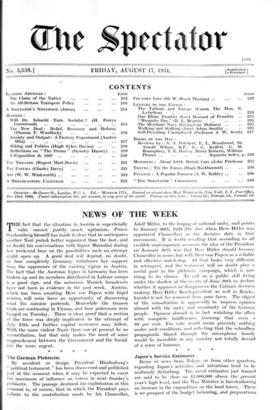The German Plebiscite By accident or design President Hindenburg's "political
testament" has been discovered and published Just at the moment when it may be expected to exert the maximum of influence on voters in next Sunday's plebiscite. The passage destined for exploitation at this moment is, of course, that in which the President pays tribute to the contribution made by his Chancellor, Adolf Hitler, to the forging of national unity, and points to January 30th, 1933 (the (late when Herr Hitler was appointed Chancellor) as the decisive date in that movement. It is worth recalling that according to all credible contemporary accounts the idea of the President on January 30th was that Herr Hitler should become Chancellor in name, but with Ilerr von Papen as a reliable and effective watch-dog. All that looks very different in retrospect, and the testament will no doubt play a useful part in the plebiscite campaign, which is now rising to its climax. To call on a public still living under the shadow of the events of June 80th to declare whether it approves or disapproves the Cabinet decision making Herr Hitler Reichsprasident as well as Reiehs- kanzler is not far removed from pure farce. The object of the consultation is apparently to impress opinion abroad with the unity and unanimity of the German people. Opinion abroad is in fact watching the affair with complete indifference, knowing that even a 99 per cent. Yes vote would mean precisely nothing under such conditions, and reflecting that the schoolboy propaganda blared through the microphone hourly would be incredible in any country not totally devoid of a sense of humour.


































